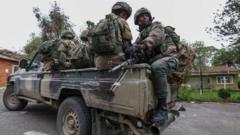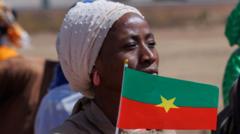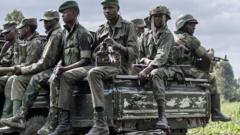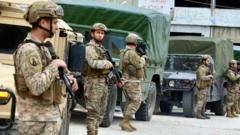In a narrative that captures both fear and resilience, a Ghanaian man, who we will refer to as James, shares his shocking experiences after being kidnapped by jihadists in Burkina Faso in 2019. In his first media interview since his release, James reveals the ordeals he faced in a sprawling desert camp run by the militant group Jama'at Nusrat al-Islam wal-Muslimin (JNIM), akin to an al-Qaeda affiliate.
Surviving the Darkness: A Ghanaian's Harrowing Tale from a Jihadist Camp
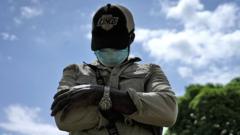
Surviving the Darkness: A Ghanaian's Harrowing Tale from a Jihadist Camp
A chilling firsthand account from a freed Ghanaian captive exposes the terrifying realities of life inside a jihadist base in Burkina Faso.
Captured while traveling to Senegal, James detailed his initial moments of terror as armed insurgents emerged amidst the chaos. He recounted that on arriving at the camp, he witnessed alarming practices including indoctrination, the training of children for violent acts, and the harrowing reality of women being captured for exploitation. Despite the fear instilled in him, James cleverly navigated his situation by pretending to sympathize with the insurgents, thereby allowing him to observe their operations closely.
Describing the camp atmosphere, James noted that it resembled a peculiar community, with music sometimes playing in stark contrast to the gruesome activities he witnessed. Remarkably, he noted the jihadists made attempts to recruit him, offering a worldview that portrayed the West as exploitative. His contact with the militants revealed complexities in their motivations, including a mix of genuine belief and desperate strategies for survival in a conflict-ridden region.
Ultimately, James managed to negotiate his freedom by lying about having a sick child at home—a statement he claims the commander believed. Post-release, he has transitioned to a new life as a subsistence farmer, but remains acutely aware of the ongoing dangers posed by extremist groups in both Burkina Faso and the wider region.
This account underscores the precariousness of security in West Africa, where nearby Ghana fears spillover violence due to increasing jihadist influence. As civil organizations work to prevent radicalization among the youth, James' story serves as a powerful reminder of the real-life struggles faced by many in the region.
Confronting terror while cultivating resilience, James' tale illuminates both personal survival and the pressing challenges faced by West Africa in the fight against rising extremism, urging stakeholders to foster understanding and proactive measures against the socio-economic issues that fuel recruitment by extremist groups.
Describing the camp atmosphere, James noted that it resembled a peculiar community, with music sometimes playing in stark contrast to the gruesome activities he witnessed. Remarkably, he noted the jihadists made attempts to recruit him, offering a worldview that portrayed the West as exploitative. His contact with the militants revealed complexities in their motivations, including a mix of genuine belief and desperate strategies for survival in a conflict-ridden region.
Ultimately, James managed to negotiate his freedom by lying about having a sick child at home—a statement he claims the commander believed. Post-release, he has transitioned to a new life as a subsistence farmer, but remains acutely aware of the ongoing dangers posed by extremist groups in both Burkina Faso and the wider region.
This account underscores the precariousness of security in West Africa, where nearby Ghana fears spillover violence due to increasing jihadist influence. As civil organizations work to prevent radicalization among the youth, James' story serves as a powerful reminder of the real-life struggles faced by many in the region.
Confronting terror while cultivating resilience, James' tale illuminates both personal survival and the pressing challenges faced by West Africa in the fight against rising extremism, urging stakeholders to foster understanding and proactive measures against the socio-economic issues that fuel recruitment by extremist groups.





